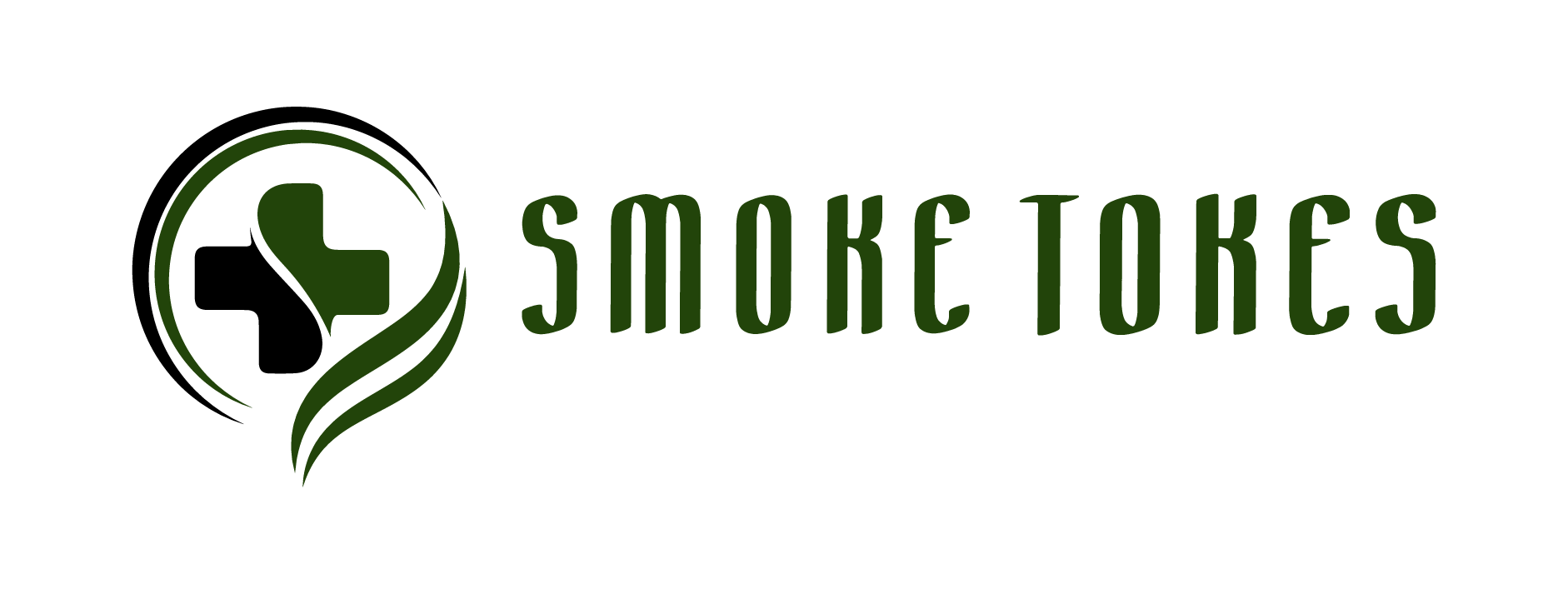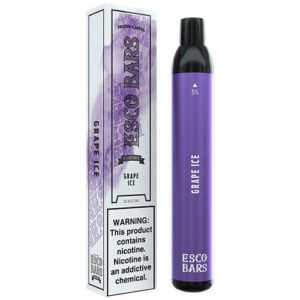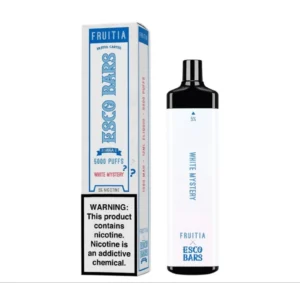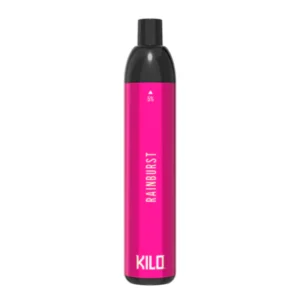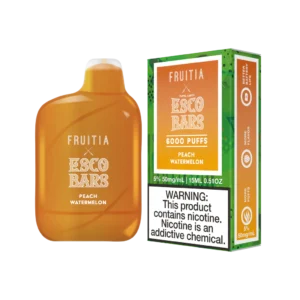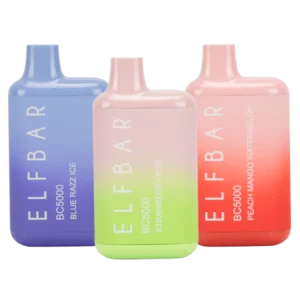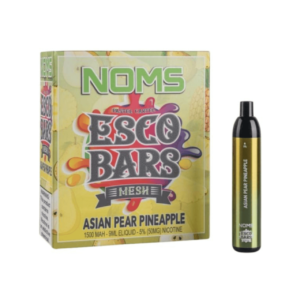

Is Delta 9 Stronger Than Delta 8? A Clear Comparison
Let’s cut right to the chase: Yes, Delta 9 THC is definitely stronger than Delta 8 THC. It’s not even a close contest. Think of Delta 9 as the classic, high-octane experience you hear about, while Delta 8 is its more laid-back, mellow cousin. This difference in intensity is the single most important thing to understand.
Understanding the Key Differences
If you’re just starting to explore the vibrant world of cannabinoids, the names “Delta 8” and “Delta 9” might sound like minor variations. But in reality, their effects, potency, and even legality are worlds apart. It all comes down to a tiny, almost invisible difference in their chemical structure, but that small shift creates a huge difference in how you’ll feel.
The reason is all about how they interact with your body’s endocannabinoid system. Researchers have found that Delta 8 just doesn’t bind as tightly to the brain’s CB1 receptors. The result? It packs about half the punch of Delta 9 THC. This means Delta 9 delivers a much more powerful and quicker psychoactive effect, which is why it’s known for producing that classic, intense high.
A Quick Comparison
So, how do you choose? It really just depends on the kind of experience you’re after. If you’re craving a potent, traditional cannabis experience, Delta 9 is your go-to. If you’re looking for something that keeps you clear-headed but wonderfully relaxed, Delta 8 is probably a better fit.
Let’s look at how their potency and legality stack up.
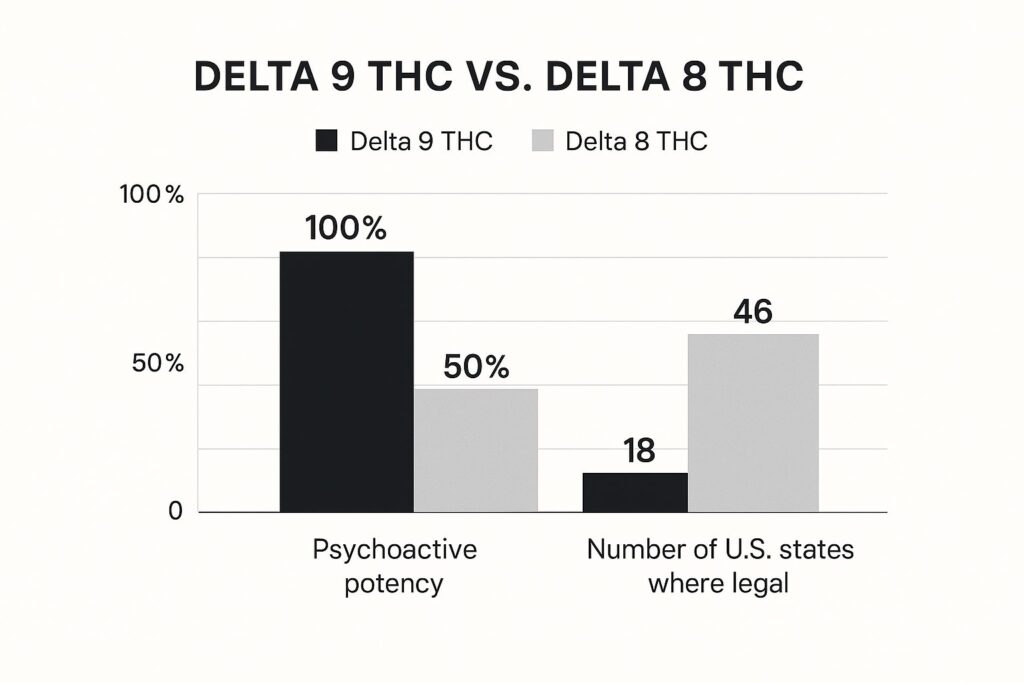
As you can see, Delta 9 is easily twice as strong, but Delta 8 has the major advantage of being legally available in many more places. It’s the classic trade-off: do you want more power or wider accessibility?
To make it even simpler, here’s a quick table that lays out the core distinctions side-by-side.
Delta 9 vs Delta 8 At a Glance
| Feature | Delta 9 THC | Delta 8 THC |
| Psychoactive Potency | High (This is the benchmark for a “high”) | Mild to Moderate (~50% of Delta 9) |
| Common Effects | Strong cerebral high, intense euphoria | Clear-headed calm, relaxing body buzz |
| Legal Status | Federally illegal, but legal in some states | Federally legal (if from hemp), but banned in some states |
| Best For | Experienced users wanting a powerful effect | Beginners or anyone seeking a less intense experience |
Ultimately, the best way to understand the difference is to see what’s out there. Exploring a curated collection of Delta 8 products can provide more insight into the milder options available on the market today.
Why Delta 9 Packs a Stronger Punch
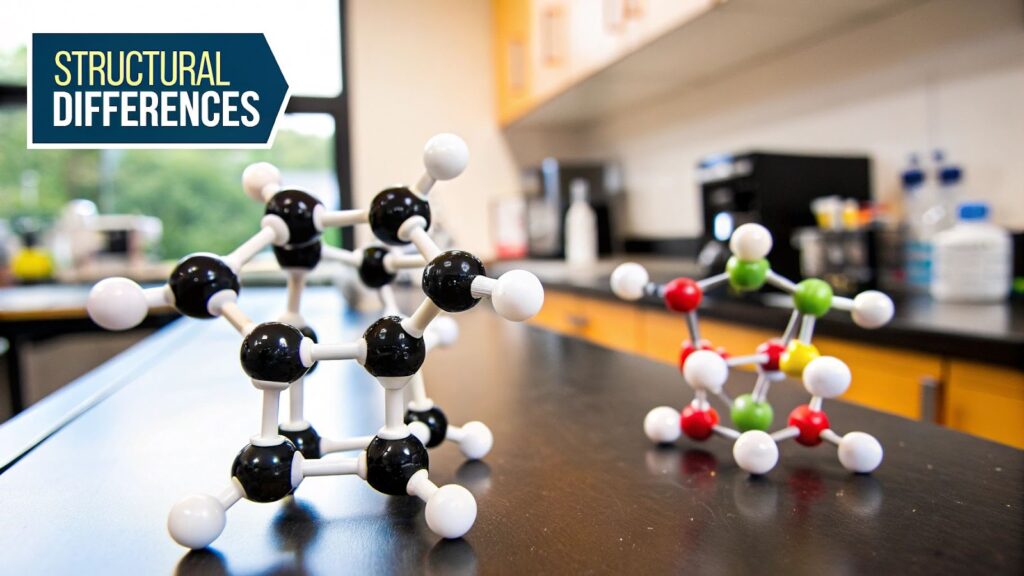
To really get why Delta 9 hits harder, you have to zoom in on its chemical makeup. Though they have nearly identical names, a tiny, almost unnoticeable difference in their atomic structure creates a massive difference in how they feel. It all boils down to where a single double bond is located on their carbon chain.
Think of it like two keys that look almost the same. One key slides into a lock, but it feels a bit wobbly and doesn’t quite turn the mechanism all the way. The other key, however, fits perfectly, engaging the tumblers with a solid, satisfying click. That’s a great way to picture how Delta 9 and Delta 8 interact with your body.
Your body runs on a complex network called the endocannabinoid system (ECS), which is filled with receptors that help manage everything from your mood to your appetite. For the psychoactive effects we’re talking about, the key players are the CB1 receptors, which are mostly found in your brain.
The Science of a Snug Fit
Delta 9 has its double bond on the ninth carbon atom. This specific placement gives it the perfect molecular shape to bind tightly and efficiently with those CB1 receptors. This snug, secure connection is exactly what triggers the potent euphoric and cerebral high it’s known for. It’s a direct, powerful interaction that unlocks the cannabinoid’s full potential.
Delta 8, on the other hand, has its double bond on the eighth carbon atom. This small shift changes its 3D shape just enough that it can’t create that same strong connection. It still binds to the CB1 receptors and produces effects, but the fit is looser, leading to a much milder, less intense experience.
So, when someone asks, “is delta 9 stronger than delta 8?” the answer is really just a matter of basic chemistry. Delta 9’s structure is a better “key” for the “lock” of your body’s CB1 receptors, delivering a more powerful effect every time.
This molecular difference doesn’t just affect potency; it also shapes the whole vibe of the experience. Many people describe Delta 8 as a smoother, clearer-headed buzz, which is a direct result of this less intense receptor binding.
While both cannabinoids have their own unique appeal, the science makes it crystal clear why Delta 9 wears the crown for sheer strength. It’s a fascinating peek into how the smallest molecular tweak can completely alter how a substance makes us feel. With so many new compounds hitting the market, understanding these details is key, much like separating the facts from fiction about CBD vaping.
Comparing the Vibe: Delta 9 vs. Delta 8 Experiences
Let’s step away from the chemistry for a moment. What does each cannabinoid actually feel like? The real difference between Delta 9 and Delta 8 isn’t just about molecular bonds; it’s about the unique atmosphere each one creates.
Here’s a good way to think about it: If Delta 9 is the headlining act at a music festival—loud, intense, and totally immersive—then Delta 8 is the laid-back acoustic set in a smaller, more intimate venue. Both offer incredible experiences, but they serve completely different moods.
The experience often starts with how quickly things kick in. Delta 9 is famous for its rapid onset, hitting you with a powerful and distinct peak that can feel all-encompassing. For many, this means a potent, cerebral high that can spark creativity, deep thought, or a powerful wave of euphoria.
Delta 8, on the other hand, guides you into the experience much more gently. The effects tend to build slowly, letting you settle in without ever feeling like you’ve been thrown into the deep end. This smoother, more gradual climb is precisely why so many people reach for it for everyday relaxation and innovative product designs.
The Head High vs. The Body Buzz
One of the biggest distinctions is where you feel the effects. Delta 9 is legendary for its strong mental effects. It has a reputation for altering perception, making music sound more vibrant, and sending your mind down fascinating new rabbit holes. The flip side is that this intensity can sometimes lead to anxiety or paranoia, particularly with higher doses.
This is where Delta 8 really shines. It’s known for a relaxing experience that’s centered more in the body. Users often talk about a calming sensation that washes over them, melting away tension without creating mental fog. You stay clear-headed and fully functional, just with a pleasant, mellow feeling of ease. This makes it a fantastic choice for unwinding after a long day or for social settings where you want to relax but stay sharp.
If you’re looking for an experience that keeps you grounded, Delta 8 provides a gentle body buzz often described as “indica-like” in its calming properties—but without the heavy mental couch-lock that can come with stronger cannabinoids.
Onset, Peak, and Duration
The timeline of the experience also sets these two apart. A Delta 9 high usually comes on fast, peaks with real intensity, and can stick around for several hours, depending on how you consumed it. The effects are often a bit of a rollercoaster: a quick climb, a thrilling peak, and a slow coast back down.
Delta 8 offers a much more predictable and even-keeled journey:
- Gradual Onset: The effects gently build over a longer period.
- Mellow Peak: Instead of a sharp spike, the high is more of a sustained, comfortable plateau.
- Shorter Duration: The entire experience is often shorter, making it a more convenient option if you have other plans for your day.
This predictability is a huge plus. For anyone who finds the sheer power and longevity of Delta 9 a little daunting, Delta 8 is a much more approachable alternative. For a deeper look into a similarly relaxed experience, you might want to explore our CBD vaping 101 guide for blissful relaxation. In the end, choosing between them comes down to personal preference and what kind of experience you’re after.
Navigating the Legal Landscape of Hemp-Derived THC
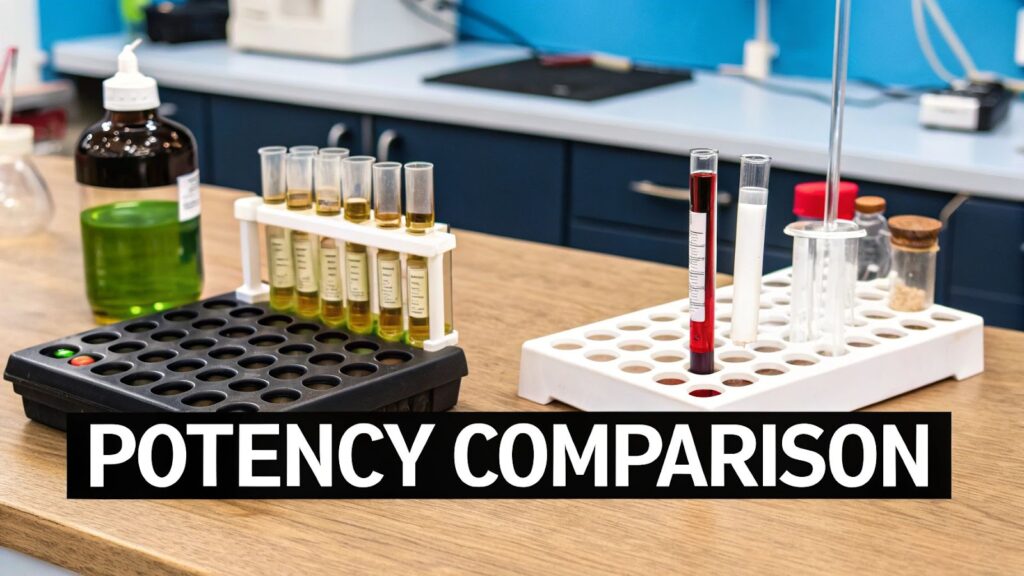
Beyond the actual effects, one of the biggest differences between Delta 8 and Delta 9 is the tangled web of laws surrounding them. While the answer to “is delta 9 stronger than delta 8” is pretty straightforward, their legal status is anything but. This entire situation stems from one landmark piece of legislation: the 2018 Farm Bill.
That bill changed everything for cannabinoids by federally legalizing hemp and its derivatives. But there was a catch. The products had to contain no more than 0.3% Delta 9 THC by dry weight. This seemingly minor detail blew the doors wide open for other cannabinoids like Delta 8 THC. Because Delta 8 is made from federally legal hemp, it found a home in a unique legal gray area, making it available in many places where traditional cannabis is still off-limits.
Don’t let “federally legal” fool you, though. It’s not a free-for-all. Many states have since passed their own laws, either banning Delta 8 outright or placing heavy restrictions on it. The result is a confusing patchwork of regulations that varies dramatically from one state line to the next.
The Two Worlds of Delta 9
It’s also important to understand that when we talk about Delta 9, we’re really talking about two legally distinct products. First, there’s marijuana-derived Delta 9. This is the classic THC that remains a federally controlled substance. You can only purchase it legally in states with regulated medical or recreational cannabis programs.
Then, there’s the new kid on the block: hemp-derived Delta 9. These innovative products are cleverly designed to comply with the Farm Bill by keeping their Delta 9 concentration below that 0.3% threshold. This has led to federally compliant gummies and edibles that can still pack a flavorful punch, adding another layer for consumers to navigate.
The core legal distinction comes down to the source. Marijuana-derived Delta 9 is federally illegal and strictly regulated at the state level. Hemp-derived Delta 8 and compliant Delta 9 are federally legal but face a complex and ever-changing map of state-specific rules.
Safety and Regulation in an Evolving Market
This legal ambiguity has huge implications for product safety. If you buy a Delta 9 product from a licensed state dispensary, it has gone through rigorous, state-mandated testing for both potency and purity. The Delta 8 market, on the other hand, operates with very little federal oversight.
Delta 9 THC is typically extracted from marijuana plants and, except where states have legalized it, remains federally illegal. This means it’s sold almost exclusively in licensed dispensaries within regulated markets. In contrast, Delta 8 is mostly synthesized from hemp-derived CBD using chemical processes. Its popularity exploded after the 2018 US Farm Bill, creating a booming market since around 2019 as a federally legal alternative. You can read more about the differences between Delta 8 and Delta 9 on texascannabisclinic.com.
This lack of regulation makes third-party lab testing absolutely non-negotiable for consumers. Any reputable brand will readily provide a Certificate of Analysis (COA) for its products, proving they are clean and free from harmful contaminants. For those navigating complex personal journeys, it’s vital to understand all available options; you might find our guide on CBD vaping and addiction recovery helpful. As a rule of thumb, always ask for a COA before you buy any hemp-derived product.
How to Choose the Right Cannabinoid for You
Picking between Delta 9 and Delta 8 goes way beyond simply asking, “is Delta 9 stronger?” The real question is about matching the cannabinoid to your lifestyle, your tolerance level, and the experience you’re hoping to create. Let’s move past the pure science and look at some real-world situations to help you find your perfect fit.
Think of it like choosing a drink. You wouldn’t grab a strong espresso right before bed, just as you might not want a sleepy-time tea before a big social event. The cannabinoid that’s perfect for a quiet night in probably isn’t the best choice for a lively concert. It’s all about context.
To make the right call, you have to think about your goals, how comfortable you are with psychoactive effects, and, of course, the laws where you live. This practical approach will help you choose with confidence.
When to Go for Delta-9: The Potent Choice
Delta 9 is the classic, high-intensity cannabinoid. Its powerful and immersive effects make it the go-to for specific situations where you really want to feel a significant shift.
- Creative Breakthroughs: If you’re an artist, musician, or writer feeling stuck, the unique perspective-shifting power of Delta 9 can be just the ticket. It has a knack for sparking new ideas and heightening your senses, which can turn a creative block into a breakthrough.
- Serious Unwinding: For those with a higher tolerance or who just need to completely decompress, Delta 9 can deliver a profound sense of calm that melts away even deep-seated stress. This is the choice for when you want to fully disconnect and become one with your couch.
- Concerts and Festivals: When you want to truly feel the music and soak up the energy of a crowd, Delta 9’s potent euphoria can elevate the whole experience. It can make the lights seem brighter and the music feel richer.
Key Insight: Choose Delta 9 when you’re looking for a powerful change in your perception. It’s best for experienced users or for special occasions where its intensity is exactly what you want.
When Delta-8 Makes More Sense: The Balanced Alternative
Delta 8 provides a much more mellow and clear-headed experience. It’s the perfect companion for moments when you want to relax or boost your mood without feeling weighed down.
- Social Events: Ever want to ease some social awkwardness at a party without getting lost in a mental fog? Delta 8 offers a mild, uplifting buzz that helps you stay present, engaged, and ready to chat.
- Winding Down After Work: After a long, stressful day, Delta 8 is great for helping you shift gears. It takes the edge off just enough to let you enjoy your evening, whether you’re making dinner or watching a movie, all while keeping your head clear.
- Productive Relaxation: If you’ve got a few chores to knock out over the weekend, Delta 8 can make them feel a lot less like work without hurting your ability to focus. Many people call it “functional” for this very reason.
- A Gentle Introduction: For anyone just starting to explore THC, Delta 8 is a fantastic entry point. It lets you dip your toes in the water and experience the benefits of cannabinoids with a much lower chance of feeling anxious or overwhelmed.
Ultimately, the best choice comes down to lining up the cannabinoid’s effects with what you need in the moment. For some, the gentle support of cannabidiol (CBD) is also a valuable part of their wellness routine. To learn more about its role, we encourage you to consult a healthcare professional, and you can also explore the potential benefits of CBD vaping for mental health in our detailed guide.
A Practical Guide to Safe Dosing and Consumption
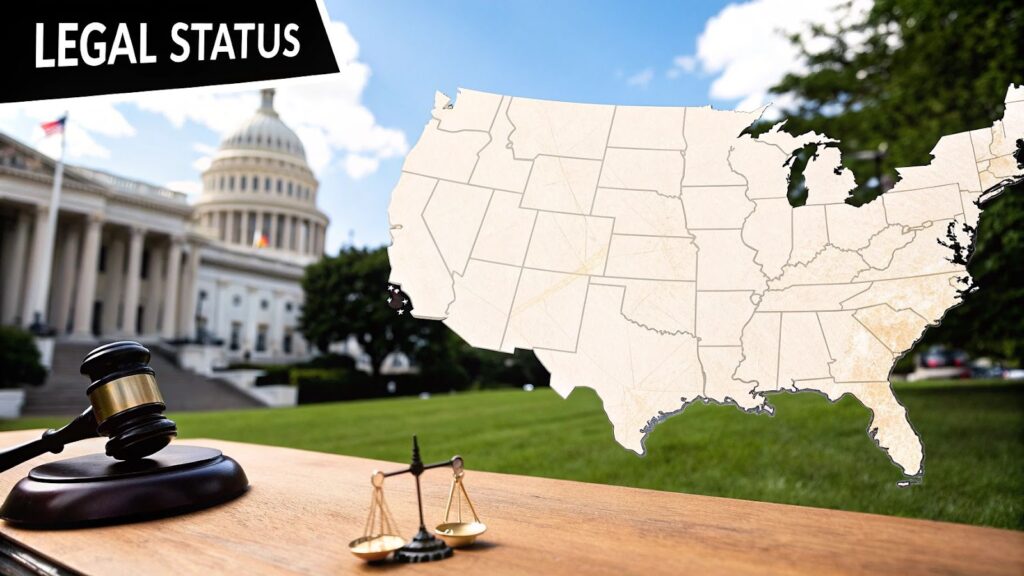
Knowing that Delta 9 is more potent is one thing; figuring out what that means for your actual dose is another. Because Delta 9 is significantly stronger, you’ll need a much smaller dose compared to Delta 8, particularly if you’re new to THC. There’s a timeless piece of advice that always applies here: start low and go slow.
Patience is your best friend, especially with edibles, which can take an hour or even longer to fully kick in. It’s easy to get impatient and take a second dose too soon, but that’s a classic rookie mistake that often leads to an overwhelming and unpleasant time.
Suggested Starting Doses for Beginners
If you’re just starting out, these guidelines can help you find your footing. Keep in mind that everyone’s body chemistry is different, so think of these as a starting point, not a hard-and-fast rule.
- Delta-9 THC: A standard dose in many recreational markets is 10mg, but for a true beginner, that can feel intense. A much safer starting point is between 2.5mg and 5mg. This lets you test the waters without getting in over your head.
- Delta-8 THC: Since Delta 8 is roughly half as potent, you can start with a higher dose. For most newcomers, a dose between 10mg and 20mg provides a pleasant, manageable buzz that’s perfect for getting acquainted with its effects.
It’s always a good idea to chat with a healthcare professional before you dive into any new cannabinoid product. If you want more personalized advice on picking the right product and dose for you, our staff at any of our physical locations are always happy to help guide you.
Common Questions About Delta-8 and Delta-9
Stepping into the world of cannabinoids can feel a bit overwhelming, and it’s natural to have questions. Let’s clear up a few of the most common ones when it comes to Delta 8 and Delta 9.
Will Delta-8 or Delta-9 Show Up on a Drug Test?
Yes, almost certainly. Standard drug tests aren’t designed to tell the difference between various THC isomers; they just look for THC metabolites in your system.
Since both Delta 8 and Delta 9 create these metabolites, either one can trigger a positive result. If you have a drug test coming up, it’s safest to steer clear of both cannabinoids entirely.
What Are the Potential Side Effects?
Because Delta 9 packs more of a punch, its side effects can feel more intense. Taking too much might lead to feelings of anxiety or paranoia, along with the classic dry mouth and red eyes. For any health concerns, we recommend speaking with a healthcare professional.
Delta 8 is known for being gentler, but you can still experience similar side effects, especially if you’re new to it or take a large dose. Most commonly, people report mild drowsiness or a dry mouth. The best advice is always to start with a very small amount and see how you feel before taking more.
Important Takeaway: The secret to a good experience is all about mindful dosing. By starting low and going slow, you can find what works for you while keeping any unwanted effects at bay.
Is One Safer Than the Other?
When we talk about safety, the real issue isn’t whether Delta 8 or Delta 9 is “better”—it’s about the quality of the product you’re buying.
Delta 9 products from state-licensed cannabis dispensaries have to pass rigorous testing for potency and purity. The rules are strict. The market for hemp-derived products like Delta 8, however, isn’t as tightly regulated. This is why it’s so important to do your homework and only buy from trusted brands. Always look for a comprehensive, third-party Certificate of Analysis (COA) for any product you consider. That lab report is your only guarantee that what you’re buying is clean, potent, and accurately labeled.
Ready to explore your options with a little help from people who know their stuff? Swing by one of the Smoke Tokes CBD and Vape Shops locations. Our friendly team is always happy to chat and help you find exactly what you’re looking for.
Nicotine is an addictive chemical. Content intended for adults 21+.
